|
Here are some pictures of a first-winter Common
Gull (Larus canus canus) taken at Shinnecock
Inlet, Suffolk County, Long Island, New York. The pictures
were taken between 7 and 9 a.m. on Sunday 28th February 1999,
under heavily overcast conditions and light rain.
The bird was first seen from the otherside of Shinnecock Inlet
by Tom Burke at the end of January 1999. At the time, it was too
distant to be firmly identified. The bird was relocated the following
weekend by Tony Lauro and Pat Lindsay who were able to study it
at close range, as it fed along the surf line. Unfortunately for
them, it remained extremely active and did not land. It was not
possible at this stage to rule out an extremely aberrant Ring-billed
Gull. Tony Lauro saw the bird again on Sunday 21 Feb, and was able
to watch it on the ground for extended periods. These views convinced
Tony that this was indeed a Common Gull. John Fritz and Joan Quinlan
studied the bird for several hours on Friday 26 Feb and likewise
identified it as a Common Gull.
Late on Saturday 27 Feb, Andy Guthrie and I joined Tony Lauro
at the inlet to look for the bird. We evenutally saw the bird after
waitng some twenty minutes. It came westwards along the beach,
flew briefly around the east jetty and then settled on the ocean
with two adult Ring-billed Gulls, where it remained, presumably
to roost for the night. Excited by our brief views, we returned
at dawn the following morning. The gull was already there foraging
along the sandy beach. In the next three hours, we were able to
get good looks as well as a many photographs. Periodically, it
would take flight, heading westward along the beach and then circling
over the ocean presumably searching for food.
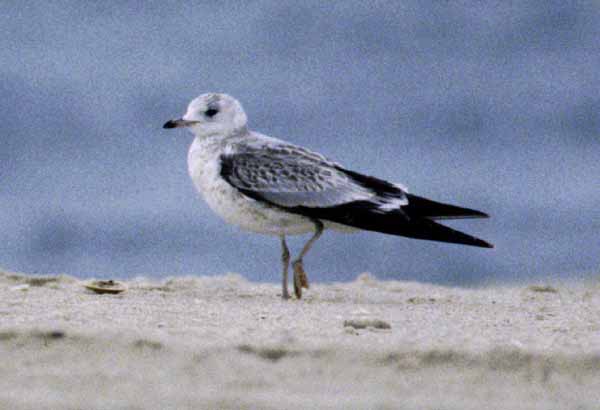
Figure 1. Side
portrait. The head is small and rounded, lacking the sloping forehead
of most Ring-billed Gulls. The head itself is very pale, except
for some diffuse streaking above the eye that extends onto the
crown. The dark eye is accentuated by dark smudging above it and
below it. This feature combined with relatively small head, creates
a 'large eye' look. The flanks show a few smudges or spots, lacking
obvious cresent shapes of most Ring-billed Gulls. The bill is shallow
lacks a sharp gonydeal angle and its tip is all dark. The bill
base is flesh with a hint of gray. In most Ring-billed Gulls of
this age, the bill is much deeper (top to bottom), has a pinker
base and usually has a pale spot on the end of the black tip.
|
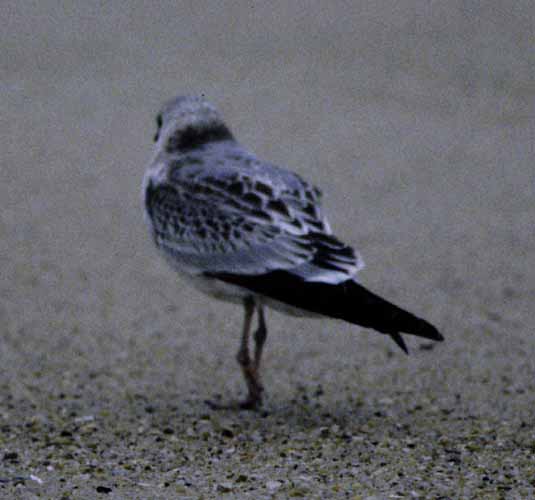
Figure 2. Walking
away from the camera. Notice the strong dark collar (or better
shawl?) effect. The upper scapulars are still molting. A
significant number of brown juvenile scapulars remain. Note
the shape of the solid dark centers to median coverts. The
greater coverts have molted and are most gray except for
the rearmost (inner coverts) which have narrow dark centers.
|
|
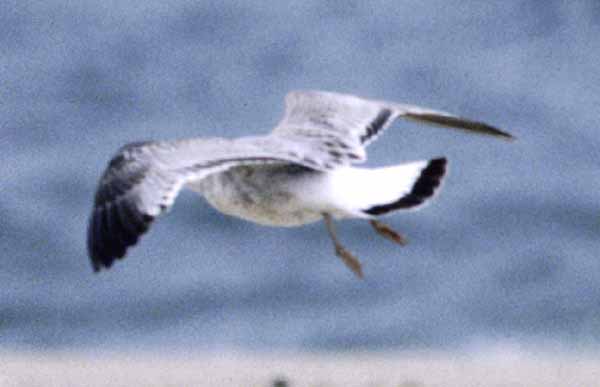
Figure 3. Slightly
out of focus and over-exposed view of the very distinctive
tail pattern. The nearest (outermost) tail feather is all
white without any marbling.
|
|
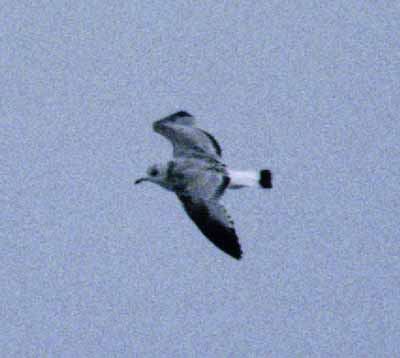
Figure 4. In flight,
showing uppersurface of the wings and mantle. Outer primaries
and primary coverts very dark brown. Inner primaries are
gray with dark 'drops' near the tips. These tend to be larger
in Ring-billed Gull. The secondary bar is dark. Subdued and
relatively ill-defined brown carpal bar. Pale gray hindneck
separated from mantle by an dark collar. Overall less contrast
across the wing than typical for Ring-billed Gull.
|
|
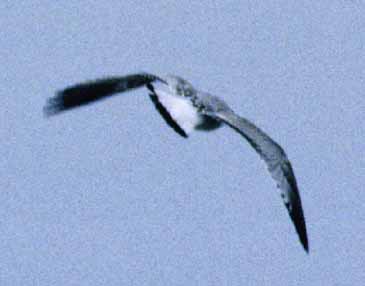
Figure 5. Another view
of the subterminal tail band, white bases to the tail feathers
and immaculate white upper tail coverts.
|
|
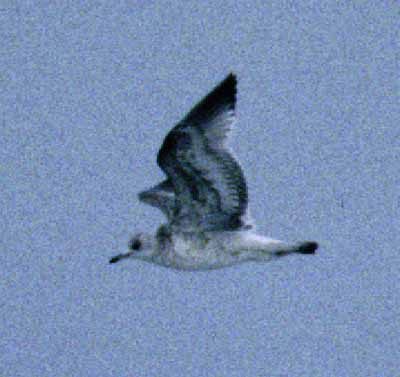
Figure 6.View
of flanks and underwing. The underwing coverts were off-white
with crisp dark edging. Some brown mottling on the underwing
coverts, more typical of juvenile plumage, remains.
|
|
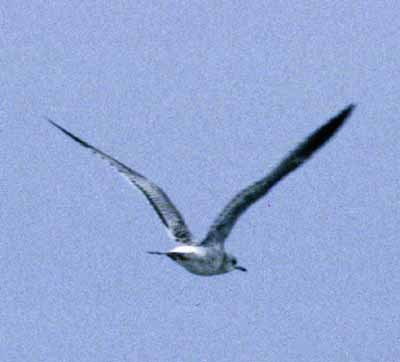
Figure 7. Flying
away. Clearly showing the long wings, 'large' eye and
small bill.
|
You can find additional images of Common Gulls on: Martin
Reid's excellent gull site.
Return
to Gallery Index
|

